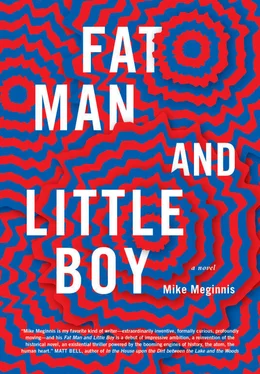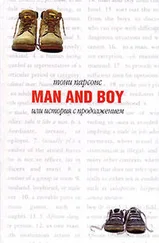“Water,” rasps someone. At first, Fat Man thinks the well is speaking. He peers over the edge, expecting a disembodied claw to hang from the rim, attached to a wrist, dangling and all corroded to nothing by shadow. Instead he spies a crunchy mop of colorless hair on the well’s opposite side, at rest against the stone. “Water,” says the mop. It tilts a little to the side.
“Are you thirsty?” says Fat Man, stupidly. He caps the jugs and circles the well, hands out as if to approach a wild dog or a cornered raccoon.
“Been waiting,” says the someone. After a long pause, “All day.”
She is a heap of rag and bone, skin the color of dishwater, dirt mustache, eyes all crusted, limp arms she can’t lift. She opens her mouth and shows him her tongue. Dry split down the middle, coarse as tree bark, half white. Her teeth rotting and soft, some of them misshapen. Gums receding like candle wax recedes.
“I’m sorry,” says Fat Man. He lowers the pail and draws the water. He has no cup. He cups his hands and pours it down her throat. She sputters a little.
“Thank you,” she says. “Very kind.” The water pools in the hollows of her collar bone, stains her blouse-rags in a spreading circle. He pours another handful in her mouth. “Very kind, very kind.”
There is mold forming on her chin. Fat Man yanks away his hands. It slows and stops. He thinks of the fog blotches that form on a window around the mouth and nostrils, growing out from the center and then retracting sharply when the breathing stops. The mold likewise shivers in, the weakest outcroppings falling away, dead chalk spores that float on the pools between her fine bones. Japanese souls, he thinks, claiming her body for their own.
“What’s your name?”
She looks down at the sprawl of her legs, and seems to lose herself in the snarls and tangles of loose fabric, the spurs of her bare ankles, the leather wrappings on her long feet.
“I thought so,” says Fat Man, taking a pen from his pocket and scraping the mold from her chin with the point. It falls like old snakeskin. “Bet you’re cold out here, aren’t you?”
He hoists her up on his shoulder. He is big but not strong. She weighs about as much as Little Boy, though she is not so warm.
“What doing?” she says. He takes the milk jugs underneath his arms. “Where?”
“There’s a place I know you can sleep the night,” says Fat Man. It should take about that long for her to die.
Fat Man hides her in the cabin where he keeps his Jewish things. The bed is clear, the sheets are mussed—sometimes he sleeps here. He lays her down, pulls up the blue blanket to her chin. The tramp makes a sticky sound in her throat. He thinks she’s going to throw up.
“Do you want milk?” he asks her. “Milk? Num num?”
She nods.
“I’ll get you some. Do you like it here?”
The tramp’s eyes roll around the room, glancing at the collection. There is a dressmaker’s dummy. There is a hat on that dummy, feathered, soft-brimmed. There are shoes hanging on the walls.
“I built this cabin,” says Fat Man, bustling around, searching for a proper cup. “Not really, I guess. But I found these things and brought them here.” There are no proper cups. They are small brass mugs, droopy cusps down-curled by the heat of hungry mouths, pinched and distended. It seems wrong for her to touch these artifacts, especially the ruined ones. He touches each one he examines, touches the toes of his shoes to the other shoes that litter the floor, as if a small crowd, scattered, facing in various directions, a careful, criss-crossed network of vision. He runs his hand through the crude wigs. Smells the shirts that hang on a rack. “What do you think the odds are you’re Jewish?”
“Milk,” she says.
“What is your name?”
He finds a squat white clay cup, brown inside, with thicker beads of paint dried hard to the surface. He pours the milk inside. It separates briefly in the pouring, not wholly—a pale swirl in a paler stream, becoming white again in the mug, though with a thin sheen layer on the surface, skim water.
“Here,” he says, and he puts his hand beneath her pillow, lifting her head. He pours the milk into her mouth, careful not to touch her skin.
“Ahh,” she sighs.
“You can sleep if you want to,” says Fat Man. “I’ll come back to see you tomorrow. I’ll bring you food.”
She further eyes the collection. He worries she will take the clothing for herself while he is gone, for warmth. He cannot bring himself to forbid it; he is doing the same.
“This is a sacred place,” he says. “You should be safe. Don’t worry if you hear anything strange. It happens sometimes.”
“Thank you,” she says. “Anne.”
“You’re welcome Anne,” says Fat Man. He takes the watered-down milk. He stands a while in the doorway, framed by the dim walls and the sky another darker shade of blue, and then he goes.
Little Boy waits for his brother in their cabin. He is seated at their little table, an empty glass before him. Some time ago he indicated, by the tilt and quiver of his chin, the flaring of his nostrils, that he might like some milk. He has been asking for a lot of milk, frequently when it is too late, when there isn’t any more. Thus the water in the milk, to thin it. Fat Man fills the glass and pours one for himself. If Little Boy sees the water in the swirl he doesn’t say anything.
If he would like something to eat tonight with his milk he doesn’t say anything.
If he has some grievance to air, some close-clutched anger, he doesn’t share that either. Only sits across from Fat Man, arms folded on the wooden tabletop, lips curled, eyes opaque, milky as the water, watery as the milk. His hair uncombed, his fingernails filthy—black crescents at his fingertips. He sips his milk and scowls at the window.
Fat Man dines on bread and cheese, holding his food through a napkin to slow the growth of molds, scraping them where they still come. He drinks the water milk. He talks to Little Boy about his day, describing unloading the supplies that came—the friendly little napkins with “Hotel Gurs” printed on their corners, the silverware case, the new sheets, spare pillows, the sweets that they’ll give away in the office, and the beginnings of an international library to be established beside the museum cabin, where borrowing books will be free, though anyone can purchase any volume they want. The inevitable marginal notes will, as Rosie sees it, add value—a reminder that readers are members of a community. There are Japanese books and German books and French, of course, and English, with illustrated dictionaries and several foreign-language encyclopedias.
“I’ve been thinking of learning Japanese,” Fat Man says. “What do you think?”
Little Boy’s eyes widen, take on a spark of life. Then he remembers to blank. Fat Man is only being provocative.
Fat Man finishes his meal. Sloshes what’s left in his cup; even half-empty it nearly spills over. “Dogs are still circling the place, trying to catch a nose of our food I imagine. Rosie says loud noise will scare them off, so I holler and rattle my keys, but they always come back.”
Little Boy lays his head down on the table. Sometimes he sleeps this way, drooling, until Fat Man can’t take it anymore and tucks him into bed. Sometimes he lets his urine go, lets it pool on the seat and run down the legs, drippling on the floor for his brother to clean up.
“It was just a girl,” says Fat Man. “Do you know what people put themselves through for girls? Do you want to be like them? You could starve to death this way. If I left you outside tonight—if I picked you up, opened the door, and dropped you off there, you would have to get up, or you could die of exposure. Or if I waited long enough to bring you back in, you would die from thirst. People do that for girls. They start fights, start wars, start books, go off to culinary school.”
Читать дальше












